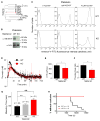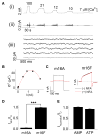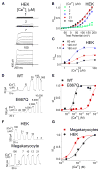TMEM16F forms a Ca2+-activated cation channel required for lipid scrambling in platelets during blood coagulation
- PMID: 23021219
- PMCID: PMC3582364
- DOI: 10.1016/j.cell.2012.07.036
TMEM16F forms a Ca2+-activated cation channel required for lipid scrambling in platelets during blood coagulation
Abstract
Collapse of membrane lipid asymmetry is a hallmark of blood coagulation. TMEM16F of the TMEM16 family that includes TMEM16A/B Ca(2+)-activated Cl(-) channels (CaCCs) is linked to Scott syndrome with deficient Ca(2+)-dependent lipid scrambling. We generated TMEM16F knockout mice that exhibit bleeding defects and protection in an arterial thrombosis model associated with platelet deficiency in Ca(2+)-dependent phosphatidylserine exposure and procoagulant activity and lack a Ca(2+)-activated cation current in the platelet precursor megakaryocytes. Heterologous expression of TMEM16F generates a small-conductance Ca(2+)-activated nonselective cation (SCAN) current with subpicosiemens single-channel conductance rather than a CaCC. TMEM16F-SCAN channels permeate both monovalent and divalent cations, including Ca(2+), and exhibit synergistic gating by Ca(2+) and voltage. We further pinpointed a residue in the putative pore region important for the cation versus anion selectivity of TMEM16F-SCAN and TMEM16A-CaCC channels. This study thus identifies a Ca(2+)-activated channel permeable to Ca(2+) and critical for Ca(2+)-dependent scramblase activity during blood coagulation. PAPERFLICK:
Copyright © 2012 Elsevier Inc. All rights reserved.
Figures







References
-
- Bevers EM, Williamson PL. Phospholipid scramblase: an update. FEBS Lett. 2010;584:2724–2730. - PubMed
-
- Bevers EM, Comfurius P, Zwaal RF. Changes in membrane phospholipid distribution during platelet activation. Biochim Biophys Acta. 1983;736:57–66. - PubMed
-
- Caputo A, Caci E, Ferrera L, Pedemonte N, Barsanti C, Sondo E, Pfeffer U, Ravazzolo R, Zegarra-Moran O, Galietta LJ. TMEM16A, a membrane protein associated with calcium-dependent chloride channel activity. Science. 2008;322:590–594. - PubMed
Publication types
MeSH terms
Substances
Grants and funding
LinkOut - more resources
Full Text Sources
Other Literature Sources
Molecular Biology Databases
Miscellaneous

